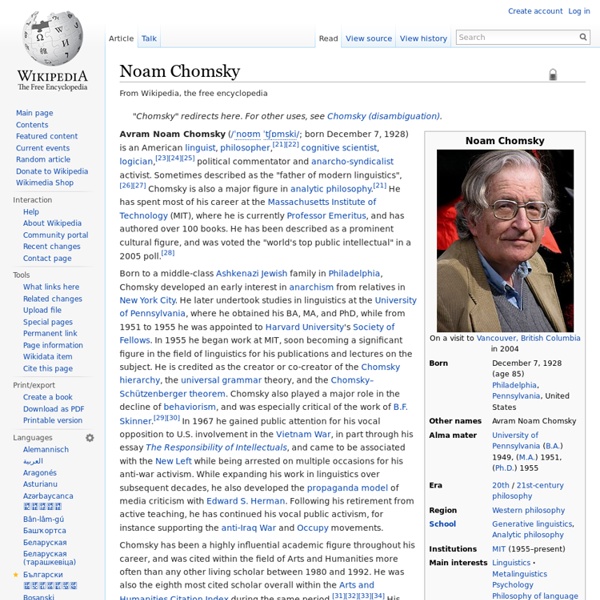Medea Benjamin
The Los Angeles Times has described her as "one of the high profile leaders" of the peace movement and in 1999, San Francisco Magazine included her on its "power list" of the "60 Players Who Rule the Bay Area." Early life[edit] Benjamin grew up on Long Island, New York, a self-described "nice Jewish girl."[1] During her first year at Tufts University, she renamed herself after the Greek mythological character Medea. She received master's degrees in public health from Columbia University and in economics from The New School.
John Pilger
John Richard Pilger (born 9 October 1939)[1][2] is an Australian-British[3] journalist based in London.[4] Pilger has lived in the United Kingdom since 1962.[5][6] Since his early years as a war correspondent in Vietnam, Pilger has been a strong critic of American, Australian and British foreign policy, which he considers to be driven by an imperialist agenda. Pilger has also criticised his native country's treatment of indigenous Australians and the practices of the mainstream media. In the British print media, he has had a long association with the Daily Mirror, and writes a fortnightly column for the New Statesman magazine.
Albert Einstein
German-born scientist who developed the theory of relativity Albert Einstein ( EYEN-styne;[4] German: [ˈalbɛʁt ˈʔaɪnʃtaɪn] ( listen); 14 March 1879 – 18 April 1955) was a German-born theoretical physicist[5] who developed the theory of relativity, one of the two pillars of modern physics (alongside quantum mechanics).[3][6] His work is also known for its influence on the philosophy of science.[7][8] He is best known to the general public for his mass–energy equivalence formula E = mc2, which has been dubbed "the world's most famous equation".[9] He received the 1921 Nobel Prize in Physics "for his services to theoretical physics, and especially for his discovery of the law of the photoelectric effect",[10] a pivotal step in the development of quantum theory. The son of a salesman who later operated an electrochemical factory, Einstein was born in the German Empire, but moved to Switzerland in 1895, forsaking his German citizenship the following year. Life and career Marriages and children
Chris Hedges
Christopher Lynn "Chris" Hedges (born September 18, 1956) is an American journalist specializing in American politics and society. Hedges is also known as the best-selling author of several books including War Is a Force That Gives Us Meaning (2002)—a finalist for the National Book Critics Circle Award for Nonfiction—Empire of Illusion: The End of Literacy and the Triumph of Spectacle (2009), Death of the Liberal Class (2010) and his most recent New York Times best seller, written with the cartoonist Joe Sacco, Days of Destruction, Days of Revolt (2012). Hedges is currently a columnist for news website Truthdig and a senior fellow at The Nation Institute in New York City.[1] He spent nearly two decades as a foreign correspondent in Central America, the Middle East, Africa and the Balkans. In 2002, Hedges was part of the team of reporters at The New York Times awarded the Pulitzer Prize for the paper's coverage of global terrorism. Biography[edit]
Charlie Rose
Early life[edit] Rose was born in Henderson, North Carolina, the only child[3] of Margaret (née Frazier) and Charles Peete Rose, Sr., tobacco farmers who owned a country store.[4][5] As a child, Rose lived above his parents' store in Henderson and helped out with the family business from age seven.[6] Rose admitted in a Fresh Dialogues interview that as a child his insatiable curiosity was constantly getting him in trouble.[7] A high school basketball star, Rose entered Duke University intending to pursue a degree with a pre-med track, but an internship in the office of Democratic North Carolina Senator B. Everett Jordan got him interested in politics.[8] Rose graduated in 1964 with a bachelor's degree in history. At Duke, he was a member of the Kappa Alpha Order fraternity.
Max Weber
Maximilian Karl Emil Weber (;[6] German: [ˈveːbɐ]; 21 April 1864 – 14 June 1920) was a German sociologist, philosopher, jurist, and political economist. His ideas profoundly influenced social theory and social research.[7] Weber is often cited, with Émile Durkheim and Karl Marx, as among the three founders of sociology.[8][9][10][11][12] Weber was a key proponent of methodological anti-positivism, arguing for the study of social action through interpretive (rather than purely empiricist) means, based on understanding the purpose and meaning that individuals attach to their own actions. Unlike Durkheim, he did not believe in monocausal explanations and rather proposed that for any outcome there can be multiple causes.[13]
David Swanson
David Swanson in 2012 David Swanson (born 1969) is an American activist, blogger and author. Education[edit]
Glenn Greenwald
Glenn Greenwald (born March 6, 1967) is an American political journalist, lawyer, columnist, blogger, and author. He was a columnist for Guardian US from August 2012 to October 2013.[1][2][3] He was a columnist for Salon.com from 2007 to 2012, and an occasional contributor to The Guardian.[4][5][6] Greenwald worked as a constitutional and civil rights litigator. At Salon he contributed as a columnist and blogger, focusing on political and legal topics.[7] He has also contributed to other newspapers and political news magazines, including The New York Times,[8][9][10] the Los Angeles Times,[11] The American Conservative,[12] The National Interest,[13] and In These Times.[14][15]



